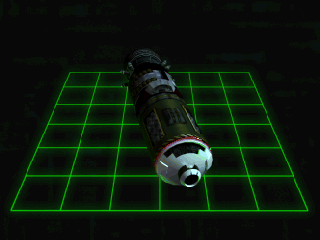GTM Cyclops
The GTM-12 Cyclops is a warhead used by the GTVA. Despite being developed shortly after the end of The Great War, the Cyclops has been a mainstay in the GTVA's arsenal since its initial deployment. Continuous upgrades to the Cyclops over its lengthy service life has seen it retain its status as the Alliance's standard-issue warhead, even after the development of the more powerful Helios torpedo.
Tech Room Data

|
|---|
| The GTM-12 Cyclops |
The GTM-12 Cyclops has been in service for over 15 years in the GTVA arsenal. It is the standard ultra-high-delivery Secondary weapon loadout, utilizing the latest in aspect-seeking guidance technologies. The Cyclops has the distinction of being the most consistently upgraded weapon in the fleet. Although its development began shortly after the Great War ended, its excellent performance has kept it firmly entrenched in the role of main assault weapon. Its payload is approximately fifty percent greater than that of the older Tsunami warheads.
Performance
Cyclops
| Name | Cyclops | |
| Range | 2375 m | |
| Reload time | 20.0 s | |
| Velocity | 95 ms-1 | |
| Damage | 2000 | |
| Armor damage | 2000 | |
| Shield damage | 40 | |
| Subsystem damage | 1000 | |
| Homing type | Aspect | |
| Minimum lock time | 5 s | |
| Turn rate (360 degress) | 1 s | |
| Shockwave radius (inner/outer) | 100 / 200 m | |
| Hitpoints | 50 |
Additional properties
- Weapon is a missile weapon (Secondary weapon)
- Weapon is marked as a bomb (Bomb)
- Weapon is capable of easily damaging even larger vessels (Huge)
- Weapon must be locked onto the target in order to be fired (No Dumbfire)
- The shockwave doubles the damage against any target that takes a direct hit
Cyclops#Short
| Name | Cyclops#Short | |
| Range | 1875 m | |
| Reload time | 20.0 s | |
| Velocity | 75 ms-1 | |
| Damage | 2000 | |
| Armor damage | 2000 | |
| Shield damage | 40 | |
| Subsystem damage | 2000 | |
| Homing type | Aspect | |
| Minimum lock time | 5 s | |
| Turn rate (360 degress) | 1 s | |
| Shockwave radius (inner/outer) | 100 / 200 m | |
| Hitpoints | 50 |
Additional properties
- Weapon is a missile weapon (Secondary weapon)
- Weapon is marked as a bomb (Bomb)
- Weapon is capable of easily damaging even larger vessels (Huge)
- Weapon must be locked onto the target in order to be fired (No Dumbfire)
- The shockwave doubles the damage against any target that takes a direct hit
Veteran Comments
Moving slowly, with an extensive aspect lock sequence and long reloading cycle, there's more to deploying a Cyclops than simply getting into range and pushing the button. The gunners of anti-fighter defenses like light beam cannons and flak guns are trained to shoot down incoming torpedoes, and the bombers that launch them. One must be very cautious in choosing the optimum approach angle, to avoid as many anti-fighter defenses as possible. While the Cyclops has maximum range of about 2.5km, its effective range should be considered to be about 500 meters or less. By releasing your weapon this close to the target, the enemy flak has a much smaller chance of disabling your torpedo in flight. If possible you should get even closer, launch the weapon at the last second, then pull up sharply and use your burners to escape the blast radius.
Guarding vessels are advised to intercept bombers as far away as possible from their intended target. This gives you time to neutralize the bombers and, if necessary, the torpedoes in flight. The GTW Morning Star and GTW Maxim are a highly recommended anti-bomber/anti-torpedo tools.
Alpha 1 and friendly bombers use the Cyclops#short, not the "full" Cyclops, until The King's Gambit. The Short is 20 m/s slower (75 vs 95) and therefore has less range, but has twice the subsystem damage (2000 vs 1000) due to the base Cyclops' .5 subsystem damage modifier.
Works fairly well against destroyers as well, unlike the GTM Tsunami.
Interestingly, the Cyclops has a decent turn rate and speed, sufficient enough to chase slower fighters. If you're out of missiles and gun energy to hit, say, a Basilisk or an Aeshma, you could try to hit it with this. Unless the target is stripped of its shields, expect it to do no more than reduce the target's rear shield to nothing, though.
The above tactic is probably more for amusement than anything else. In the given situation it would almost certainly be easier to divert energy to weapons.
Calculations point out that this weapon has a yield equivalent to approximately 3.1 GT (Gigatons of TNT).